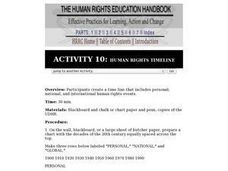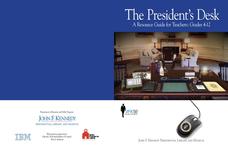Curated OER
Taking the Human Rights Temperature of Your School
Students evaluate their school's human rights climate. They administer a survey, participate in discussion groups and consider the human rights enjoyed by various groups including subgroups of gender, race and sexual orientation.
Curated OER
Human Rights Timeline
Students create a time line that includes personal, national, and international human rights events. The lesson is very personal and encourages students to understand themselves and others within the community.
Curated OER
The Body of Human Rights
Students, in groups, draw a life-size outline of a person on paper. They then place each article of the Universal Declaration of Human Rights on a part of the body, writing the number of the article in the appropriate place (e.g.,...
Curated OER
United Nations International Declaration of Human Rights (1947) - 12 October 2000
Students use the 1947 Declaration of Human Rights to explore the concept of basic human rights in relation to past and present world situations. They brainstorm or think of cases where rights are being abused at school, in Australia or...
Stanford University
Letter from Birmingham Jail: The Power of Nonviolent Direct Action
What strategies are most effective in changing an unjust law? Class members examine the tactics used in the Birmingham Campaign of 1963 (Project C) to achieve social justice and social transformation. After examining documents that...
C-SPAN
14th Amendment Equal Protection Clause
Two Supreme Court cases, Plessy v. Ferguson and Brown v. Board of Education take center stage in a lesson about the Equal Protection Clause of the 14th Amendment. Class members research both cases to compare and contrast the rulings.
City University of New York
African Americans and the Populist Movement
Why did the Populist Party fail to ally itself with African American farmers? To answer this essential question, class members investigate the Populist Era (188-1900) and read an article written by Tom Watson, a Populist leader.
University of California
Principles vs. Practices
Have you ever wondered what your own World Order would look like? Scholars use primary and secondary documents as well as video clips to investigate and analyze the Cold War. Using the sources, the principles and practices of nations...
Center for Civic Education
The Power of Nonviolence: The Children's March
What was the Children's Crusade and how did it impact the civil rights movement in the United States? Your young learners will learn about this incredible event through a variety of instructional activities, from reading a poem and...
US House of Representatives
Congresswomen in an Age of National Crises, 1935–1954
Class members investigate congresswomen and the role these senators and representatives played in congress during the period from 1935–1954.
National Park Service
Lesson 3: Resistance
During the time of slavery, resistance was a way of life for the men and women held in bondage. Using music as evidence of their fight against oppression, learners explore how enslaved people fought back. Writing prompts round out the...
Curated OER
Not Just A Man's War
Students write 2 letters from a woman who may have lived during the Civil War and 2 letters from her relative which include factual information that they have research using the Internet and other resources, along with other activities.
Staples Foundation For Learning
The President’s Desk
What stories can a desk paperweight and picture frame possibly tell us about the president of the United States? Pupils are transported to the desk of President John F. Kennedy through an engaging interactive site. The guide offers a...
Echoes & Reflections
The Children and Legacies Beyond the Holocaust
Using video testimony, primary source documents that detail international agreements, and structured discussions, learners consider the precarious position of children during the Holocaust and other international conflicts, and how to...
Curated OER
Human Rights Squares
Students read the Universal Declaration of Human Rights (UDHR) and then participate in an activity in which they discuss instances where human rights have been violated.
Curated OER
Human Rights in the News
Students, in groups, review recent newspapers and news media. They construct a poster using items from the newspaper grouped under four categories: rights being practiced or enjoyed, rights being denied, rights being protected, and...
Curated OER
I Have A Dream
Students create a reader response essay as they react to the I Have A Dream speech made by Martin Luther King. In this Martin Luther King lesson plan, students read the speech, fill out a Civil Rights movement sheet, have discussions,...
Curated OER
Rights and the Wyandotte Constitution
Students use graphic organizers to analyze the Wyandotte Constitution. They read and discuss the Wyandotte Constitution, identify the civil rights granted to the people of Kansas and consider exceptions based on gender and race.
Curated OER
Martine Luther King Jr. and John Lewis: Speeches at the March on Washington, August 1963
Ninth graders study the Civil Rights Movement. In this American History lesson, 9th graders analyze the speeches of major civil rights leaders. Students compare and contrast the meanings of these speeches.
Curated OER
American Civil War Group Creative Writing Activity
In this Civil War worksheet, students work with a group and have 25 minutes to write a story about the Civil War, using a group of vocabulary words about the war.
Curated OER
Roads to Refuge: Refugees in Australia
Learners identify terms asylum seeker, refugee and migrant, and discuss differences. Students examine significance of persecution in refugee context, explore concept of human rights and discuss some key articles from Universal...
Curated OER
Philanthropy and You
Learners identify human rights and study the values of historical figures who fought for human rights. In this human rights lesson, students define the term human rights and research examples of human mistreatment in history. Learners...
Curated OER
News Watch
Eighth graders explore the concept of human rights. In this US History lesson, 8th graders research newspaper articles that deal with human rights and prejudice. Students write a summary of their article and share it with the class.
Curated OER
F is for Fair!
Ninth graders examine their human right to education. In this American Government lesson, 9th graders evaluate how well the world is doing when it comes to providing a free, equal, quality education to our youth.

























